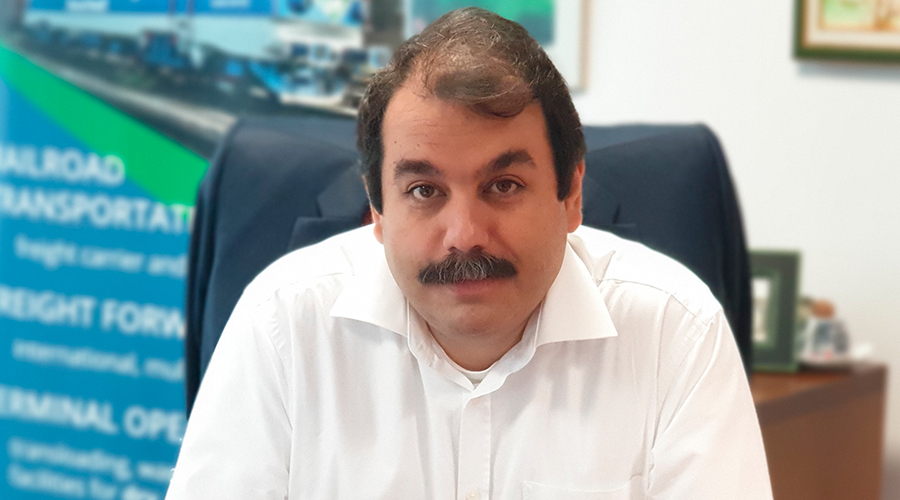
Part of the Unicom Group, a group of private Romanian companies with activities in several industries, Unicom Tranzit provides railroad freight transportation, international freight forwarding, and services such as train maintenance and railroad facility management. Global clients such as Arcelor Mittal, the world’s leading steel and mining company, attest to the company’s efficiency. Unicom Tranzit CEO Bogdan Ciobanu reviews the state of the industry and the challenges up ahead for Romanian transportation
You have been with Unicom since 1996. How has the company evolved throughout this time?
At the beginning there were a few companies that worked together as a group: there was a trader, a transporter, a storage company, an asset company. But it was not a group per se because Romanian legislation on holdings is quite new. By the time the legislation was introduced, we were no longer interested in organizing ourselves as a holding. Step by step we began working in private transportation. One of our first activities was transporting goods imported by trading companies. Then we began to buy coal wagons and tank wagons to carry coal, diesel and gasoline, which were Unicom’s main imports. And we also began building the terminals at the border so we could more easily reload the freight cars. When the railroad market was opened up, we were able to work as a private operator. We also started purchasing locomotives, and now own around 20 electric locomotives, 30 diesel locomotives, 1,400 freight cars, and we also use around 2,000 rented freight cars. We do all kinds of transportation, from containers to metal products, oil, grain and more, and we have 10% of the market share for private operators. In 1996, when I joined, there were about 10 people working at Unicom Tranzit, and now there are 980.
And now you are doing more maintenance as well?
We do around 85% of the maintenance ourselves; we have a workshop for our freight cars and locomotives in Fetesti, and in Târgoviște we have a workshop for diesel locomotives. This past summer we also began doing maintenance for third parties. We recently completed a revision of 140 wagons for a client, and we are investing in this kind of service. After transportation and shunting, maintenance is starting to be an important activity for us.
Do you see this as a new trend for the company?
Yes, we are trying to develop our workshops for third parties from the service point of view. We also aim to do maintenance in the places where we already do shunting for our clients, which is in six locations. Part of this activity also entails the revision and maintenance of the railroad lines, which we also want to do for our clients. These are not state-owned lines, they are private, industrial lines owned by our clients.
How do you see the industry in Romania, where there are 30 operators?
The problem is with CFR Marfa, the state-owned freight railway company. Because of political reasons, they can introduce market prices that are not always sustainable. As for the Austrian or German companies operating here, it is a different kind of competition because they have access to wagons and locomotives that are no longer modern. Ultimately it’s a fair competition, and we respect each other.
How do you attract and retain valuable personnel?
Around 30% of personnel are constantly switching employers, mostly because they’ve been promised better wages or conditions. But some of these have come back to us after six months. The operators have started to provide training, although this poses a problem because of legislation by the State, which wants to keep a monopoly on this type of training, or at least the theoretical aspects of training. But we want to teach theory too, besides offering practical training. A further issue we face is workers who leave for months at a time to work in neighboring countries. It is hard to find local drivers sometimes, especially as the position requires a high school diploma. In Bulgaria they are hiring people from Azerbaijan and other countries. We have tried hiring Romanian speakers from Ukraine and Moldova. The main thing is providing the right training.
Would you consider going expanding to other countries?
We already have cooperation agreements with state operators in Serbia, Ukraine and Moldova, and with private operators in Hungary and Bulgaria. This provides a major link for railway traffic passing through southeastern Europe. We are able to cross borders without any trouble. Romania is too small for this kind of market.
How can Romania improve its international image?
From the railway industry’s point of view, an improvement would be for Romania to get high-speed rail. The main problem in this country is infrastructure, whether road or railway. You cannot bring high-performance locomotives to our rail network because in four days you would be losing money already. When high-speed rail arrives, the price of transportation will also change. The client wants low prices. If you come with new locomotives and freight cars you cannot offer low prices, but you can offer high speed to move more goods, which is also an advantage for the client. Road transport is still slow too, and automakers are also interested in improvements.
Do you think it possible to develop PPPs for certain projects?
Between a public private partnership and cooperation with the EU, I prefer the second because it is more transparent. It’s a political problem that we are not accessing the funds. The government changes in the last electoral cycle illustrate this, with changes to the general directorship of CFR Marfa. This constant change of people makes it difficult to keep up talks. But for sure we need a highway between Bucharest and Brașov. When I go to Constanța and I have a modern motorway from beginning to end, it is a wonderful feeling.